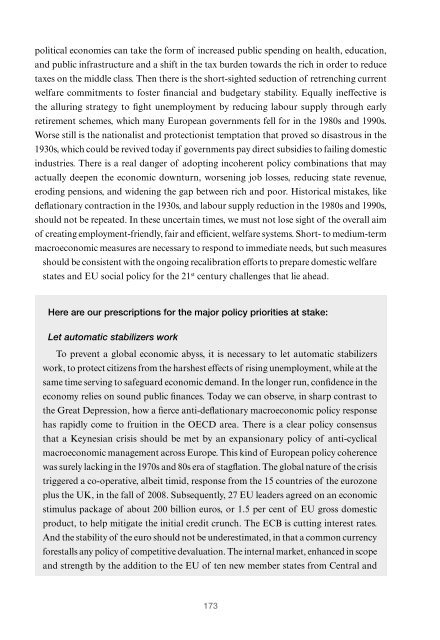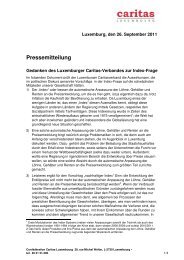Sozialalmanach - Caritas Luxembourg
Sozialalmanach - Caritas Luxembourg
Sozialalmanach - Caritas Luxembourg
Create successful ePaper yourself
Turn your PDF publications into a flip-book with our unique Google optimized e-Paper software.
political economies can take the form of increased public spending on health, education,<br />
and public infrastructure and a shift in the tax burden towards the rich in order to reduce<br />
taxes on the middle class. Then there is the short-sighted seduction of retrenching current<br />
welfare commitments to foster financial and budgetary stability. Equally ineffective is<br />
the alluring strategy to fight unemployment by reducing labour supply through early<br />
retirement schemes, which many European governments fell for in the 1980s and 1990s.<br />
Worse still is the nationalist and protectionist temptation that proved so disastrous in the<br />
1930s, which could be revived today if governments pay direct subsidies to failing domestic<br />
industries. There is a real danger of adopting incoherent policy combinations that may<br />
actually deepen the economic downturn, worsening job losses, reducing state revenue,<br />
eroding pensions, and widening the gap between rich and poor. Historical mistakes, like<br />
deflationary contraction in the 1930s, and labour supply reduction in the 1980s and 1990s,<br />
should not be repeated. In these uncertain times, we must not lose sight of the overall aim<br />
of creating employment-friendly, fair and efficient, welfare systems. Short- to medium-term<br />
macroeconomic measures are necessary to respond to immediate needs, but such measures<br />
should be consistent with the ongoing recalibration efforts to prepare domestic welfare<br />
states and EU social policy for the 21 st century challenges that lie ahead.<br />
Here are our prescriptions for the major policy priorities at stake:<br />
Let automatic stabilizers work<br />
To prevent a global economic abyss, it is necessary to let automatic stabilizers<br />
work, to protect citizens from the harshest effects of rising unemployment, while at the<br />
same time serving to safeguard economic demand. In the longer run, confidence in the<br />
economy relies on sound public finances. Today we can observe, in sharp contrast to<br />
the Great Depression, how a fierce anti-deflationary macroeconomic policy response<br />
has rapidly come to fruition in the OECD area. There is a clear policy consensus<br />
that a Keynesian crisis should be met by an expansionary policy of anti-cyclical<br />
macroeconomic management across Europe. This kind of European policy coherence<br />
was surely lacking in the 1970s and 80s era of stagflation. The global nature of the crisis<br />
triggered a co-operative, albeit timid, response from the 15 countries of the eurozone<br />
plus the UK, in the fall of 2008. Subsequently, 27 EU leaders agreed on an economic<br />
stimulus package of about 200 billion euros, or 1.5 per cent of EU gross domestic<br />
product, to help mitigate the initial credit crunch. The ECB is cutting interest rates.<br />
And the stability of the euro should not be underestimated, in that a common currency<br />
forestalls any policy of competitive devaluation. The internal market, enhanced in scope<br />
and strength by the addition to the EU of ten new member states from Central and<br />
173








